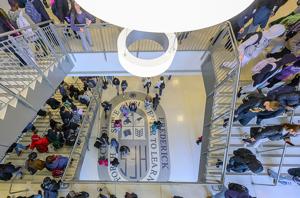Education
Essential Tips for First-Year College Students and Their Parents

Starting college is a significant milestone that represents both opportunity and uncertainty. As students transition from high school to higher education, they face new challenges that can impact their mental health and overall well-being. To help ease this transition, experts recommend four essential tips that can foster resilience and support students in their new environment.
Understanding the Transition
The leap from a structured high school schedule to the more flexible college environment can be disorienting. For many students, this is the first time they are responsible for managing their daily lives independently. They must decide when to study, what to eat, and how to spend their time without parental guidance. This newfound freedom can be exciting but also overwhelming.
According to research published in Buletin Psikologi, recognizing that feelings of awkwardness and uncertainty are common during this period can be empowering. Most students experience challenges during their first weeks, but they often feel isolated in their struggles. Encouraging students to connect with peers through simple introductions or participation in campus events can help alleviate this sense of loneliness.
Small acts of connection—like saying “Hi, I’m [your name]” to a classmate or joining a club—can lead to meaningful relationships. These interactions not only ease the adjustment period but also help students realize that they are not alone in their experiences.
Establishing Routines and Seeking Help
Creating a structured routine is vital for managing the transition smoothly. Students should consider using planners or mobile apps to keep track of exams, assignments, and deadlines. Visualizing their responsibilities can significantly reduce anxiety. Additionally, it is important for students to schedule demanding courses during their peak energy times and to avoid cramming their days with back-to-back commitments.
The first semester is an ideal time for self-discovery, and students are encouraged to explore different interests and activities. This exploration may include trying out new courses, joining research projects, or even volunteering. Such activities not only contribute to personal growth but also foster a sense of community.
Seeking help is another crucial aspect of this transition. Whether it involves reaching out to professors during office hours, consulting academic advisors, or discussing concerns with roommates or family, asking for assistance demonstrates maturity and self-awareness.
College life is not just about academic success; it is also about personal development. Students should focus on understanding their motivations and values, which can serve as anchors during challenging times.
Finding Balance and Building Relationships
While the social pressures of college can be intense, students should remember that they do not have to fit into any idealized version of success. Instead, they can find belonging by being their authentic selves. Balancing social commitments with personal well-being is essential; students can choose to engage in activities that align with their interests while also setting boundaries to avoid burnout.
Some students find it helpful to combine socializing with studying, such as meeting friends at the library or organizing group study sessions. This approach allows them to maintain connections while also staying focused on their academic responsibilities.
As students navigate their first year, it is crucial for them to introduce themselves to their professors. Establishing rapport with faculty can lead to mentorship opportunities and enhance their learning experience.
Every student’s college journey is unique. While some adapt quickly to their new environment, others may take longer to find their footing. Embracing vulnerability and uncertainty can pave the way for strong relationships, self-trust, and personal growth.
For parents, educators, and mental health professionals, the goal is not to eliminate discomfort but to support students in understanding and managing it. By reflecting on their identities and acting with intention, students can lay the groundwork for lifelong resilience.
In summary, college is more than a place to earn a degree; it is a transformative experience where young adults learn to navigate life on their own terms.
-

 Technology4 months ago
Technology4 months agoDiscover the Top 10 Calorie Counting Apps of 2025
-

 Health2 months ago
Health2 months agoBella Hadid Shares Health Update After Treatment for Lyme Disease
-

 Health3 months ago
Health3 months agoErin Bates Shares Recovery Update Following Sepsis Complications
-

 Technology4 weeks ago
Technology4 weeks agoDiscover 2025’s Top GPUs for Exceptional 4K Gaming Performance
-

 Technology2 months ago
Technology2 months agoElectric Moto Influencer Surronster Arrested in Tijuana
-

 Technology4 months ago
Technology4 months agoDiscover How to Reverse Image Search Using ChatGPT Effortlessly
-

 Technology4 months ago
Technology4 months agoMeta Initiates $60B AI Data Center Expansion, Starting in Ohio
-

 Technology4 months ago
Technology4 months agoRecovering a Suspended TikTok Account: A Step-by-Step Guide
-

 Health4 months ago
Health4 months agoTested: Rab Firewall Mountain Jacket Survives Harsh Conditions
-

 Lifestyle4 months ago
Lifestyle4 months agoBelton Family Reunites After Daughter Survives Hill Country Floods
-

 Technology3 months ago
Technology3 months agoUncovering the Top Five Most Challenging Motorcycles to Ride
-

 Technology4 months ago
Technology4 months agoHarmonic Launches AI Chatbot App to Transform Mathematical Reasoning




















